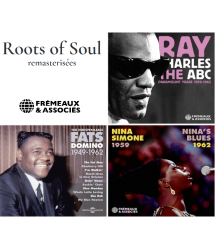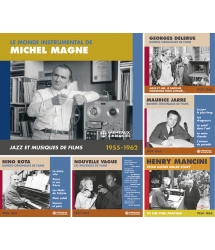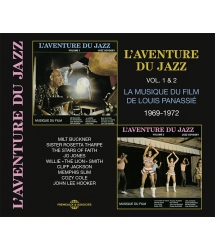Louis Panassié, son of the pioneering French jazz researcher Hughes Panassié obviously has a thing for jazz drummers – on this release there is a long solo by Jo Jones, taking over organist Milt Buckner’s version of « Caravan » almost entirely, New Orleans drummer Zutty Singleton has three short totally solo tracks (though the longest, “New Orleans Drums” is certainly interesting), and both Michael Silva (probably just as he had settled in France) and Cozy Cole also have one solo piece. Once those have been dealt with though, what is left is some fine jazz – with several names of interest to blues lovers – and lots of blues and gospel. Louis and Claudine Panassié intended to document many of the jazz greats who were still around at the time, but they also bought a “professional” tape recorder to ensure that the sound would be adequate - here it is certainly more than that, and even at the time, quality meant that there were two albums of music featuring on the soundtrack released on LP by Jazz Odyssey; later they were on CD with some previously unreleased music. The Panassié Stompers include Tiny Grimes on guitar, and The Buddy Tate Celebrity Club Orchestra Has sometime r&b session sax player Tate in a bluesy mood. Sax player Eddie Barefield, another name I recognized from several big bands, and work with The Harlem Blues & Jazz Band, is also present her with the aforementioned Stompers and with trumpeter Dick Vance’s Orchestra. Willie “The Lion” has three fine solo examples of his stride piano playing; Cliff Jackson, another stride pianist, has three numbers accompanied by Zutty Singleton – Cliff died less than a year later. Milt Buckner’s three pieces on the second disc are a vast improvement on those on disc one, and jazzman Charlie Shavers, a trumpeter, sings a rather fine blues to close out the set. The blues performers themselves comprise – inevitably – Memphis Slim, including an almost simultaneous translation of “Beer Drinking Woman” into French by Madeleine Gauthier (Hughes’ assistant and wife), and a brace of solo numbers by John Lee Hooker from 1969. Gospel too is well-represented – Sister Rosetta Tharpe has two numbers on which she accompanies herself on piano, another where she talks about herself, and four vocal and guitar numbers (on “Guitar Is A Gift Of God” she discusses her playing style) – all well worth hearing. There are also excerpts from a church in Philadelphia and two fine numbers from the same date and place by The Stars Of Faith. Now how about Frémeaux giving us the visuals to go with the music?
Par Norman DARWEN – BLUES & RHYTHM
Par Norman DARWEN – BLUES & RHYTHM











